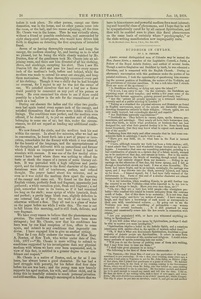< Kabbalistic Views on "Spirits" As Propagated by the Theosophical Society (continued from page 4-149) >
became contaminated with the world of darkness, or the world of Satan (evil), of which it must be purified, before it could ascend again to celestial happiness. Suppose a drop of water enclosed within a capsule of gelatine and thrown in the ocean; so long as the capsule remains whole, the drop of water remains isolated: break the envelope, and the drop becomes a part of the ocean, its individual existence has ceased. So it is with the spirit, so long as its ray is enclosed in its plastic mediator or soul, it has an individual existence. Destroy this capsule (the astral man, who then becomes an elementary), which destruction may occur from the consequences of sin, in the most depraved and vicious, and the spirit returns back to its original abode—the individualization of man has ceased.” “This militates,” he adds, “with the idea of progression, that Spiritualists generally entertain. If they understood the law of harmony, they would see their error. It is only by this law that individual life can be sustained; and the farther we deviate from harmony the more difficult it is to regain it.” To return to Lévi, he remarks (La Haute Magie, Vol. I, p. 319), “When we die, our interior light (the soul) ascends, agreeably to the attraction of its star (the spirit), but it must first of all get rid of the coils of the serpent (earthly evil—sin); that is to say, of the unpurified astral light, which surrounds and holds it captive, unless, by the force of will, it frees and elevates itself. This immersion of the living soul in the dead light (the emanations of everything that is evil, which pollute the earth’s magnetic atmosphere, as the exhalation of a swamp does the air) is a dreadful torture; the soul freezes and burns therein, at the same time.”
The kabalists represent Adam as the Tree of Life, of which the trunk is humanity; the various races, the branches; and individual men, the leaves. Every leaf has its individual life, and is fed by the one sap; but it can live through the branch, as the branch itself draws its life through the trunk. “The wicked,” says the Kabala, “are the dead leaves and the dead bark of the tree. They fall, die, are corrupted, and changed into manure, which returns to the tree through the root.”
My friend, Miss Emily Kislingbury, of London, Secretary of the British National Association of Spiritualists, who is honored, trusted and beloved by all who know her, sends me a spirit-communication obtained, in April, 1877, through a young lady, who is one of the purest and most truthful of her sex. The following extracts are singularly à propos to the subject under discussion: “Friend, you are right. Keep our Spiritualism pure and high, for there are those who would abase its uses. But it is because they know not the power of Spiritualism. It is true, in a sense, that the spirit can overcome the flesh, but there are those to whom the fleshly life is dearer than the life of the spirit; they tread on dangerous ground. For the flesh may so outgrow the spirit, as to withdraw from it all spirituality, and man become as a beast of the field, with no saving power left. These are they whom the Church has termed “reprobate,” eternally lost, but they suffer not, as the Church has taught—in conscious hells. They merely die, and are not; their light goes out, and has no conscious being.” (Question): “But is this not annihilation?” (Answer): “It amounts to annihilation; they lose their individual entities, and return to the great reservoir of spirit—unconscious spirit.”
Finally, I am asked: “Who are the trained seers?” They are those, I answer, who have been trained from their childhood in the pagodas, to use their spiritual sight; those whose accumulated testimony has not varied for thousands of years as to the fundamental facts of Eastern philosophy; the testimony of each generation corroborating that of each preceding one. Are these to be trusted more, or less, than the “communications of “bands,” each of whom contradicts the other as completely as the various religious sects, which are ready to cut each other’s throats, and of mediums, even the best of whom are ignorant of their own nature, and unsubjected to the wise direction and restraint of an adept in psychological science?
No comprehensive idea of nature can be obtained except by applying the law of harmony and analogy in the spiritual as well as in the physical world. “As above, so below,” is the old Hermetic axiom. If Spiritualists would apply this to the subject of their own researches, they would see the philosophical necessity of there being in the world of spirit as well as in the world of matter, a law of the survival of the fittest.
Respectfully,
Buddhism in Ceylon
Among several distinguished men of Colombo may be named the Hon. James Alwis, a member of the Legislative Council, a Jurist, a Fellow of the Royal Asiatic Society, and author of several books. Though a native Singhalese and Buddhist by birth, he was educated a Christian, and is connected with the English Church. During an afternoon’s conversation with this gentleman under the portico of his palatial residence, I took the opportunity of questioning him concerning the present position of Buddhism, the nature of the Veddahs, and the prevalence of Oriental occultism. It was a rich mine that I struck.
Here are some of the specimens:—
“Is Buddhism declining, or dying out, upon the island?”
“It is not, I am sorry to say. On the contrary, the Buddhists are repairing some of their temples; and within a few years some of the priests have become aggressive, gaining ground previously lost.”
“Are the ‘priests all grossly ignorant,’ as a returned missionary recently said at a public meeting in London?”
“Taking as a standard the physical sciences, and literature as found in English universities, many of the priests are decidedly illiterate, devoting themselves entirely to their religion. Others, again, are not only really learned, but exceedingly shrewd and capable.”
“Are Buddhists naturally superstitious?”
“Decidedly so. They believe in omens, signs, spells, demons, premonitions, and astrology. They nearly all have their horoscopes cast, soon after birth, to know what profession or business they are best designed for, and what their general destiny is to be. Some have them recast frequently, that they may know what to expect each month and day of the month.”
Gathering from this reply and other remarks that he had some considerable faith in astrology, I made bold to ask—
“Have you any faith, sir, in what here in the East is termed astrology?”
“I have, although recently my faith has been a little shaken; still, I must admit that I have had wonderful things foretold me by astrologists. I remember that once my consulting astrologist, pointing to a bad combination of planets on a certain day of a future month, warned me to be cautious on that day, and remain at home. But in the multiplicity of legal matters the words of warning, though noted down at the time, had entirely slipped from my memory. . .. Riding in my carriage on the afternoon of that day, the horse sprang, and I felt as though a thunderbolt struck my head. I was at once insensible. The horse had taken fright, and in an instant, seemingly, the carriage was upset, and I was thrown into the ditch, severely injured, and taken up for dead.... I blamed myself, for I had been fully warned of the unfortunate day. Facts of this and of a similar character are almost innumerable in this country.”
“It is my intention, when reaching Kandy, to go still further into the country to see the Veddahs—that tribe reported to be too low in the scale of beings to laugh. Have you ever seen them, sir?”
“Oh, yes; they are a very low, wild people—the aborigines probably—who reached this island in remote antiquity from the extreme south of India. But of this there is no certainty. It is not true that they ‘never laugh,’ and have ‘no notion of music.’ I have seen them laugh, and they have a knowledge of such music as corresponds to their own wild, uncultivated natures…. By going out to see the Veddahs you may see something of polyandria — one woman married to several husbands.... It is still practised to some extent, and occasionally comes into the law courts in connection with estates.”…
“Are you acquainted with, or have you witnessed anything relating to Spiritualism?”
“If you will define what you mean by Spiritualism, perhaps I shall be able to answer you more intelligibly.”
“Spiritualism implies a belief in the Infinite Spirit, and a conscious intercourse with spirits—that is, the spirits of mortals called dead.”
“Oh, if that is what you denominate Spiritualism, doubtless a great majority of Asiatic people are Spiritualists. It enters in some form into nearly all the concerns of life, secular and religious. I could relate many accounts of spirits returning into our midst.”
“Will you do me the favour of putting some of them into writing, that I may from time to time use them?”
“I shall take great pleasure in so doing.”
The following is the first of these written statements:—
<... continues on page 4-151 >
Editor's notes
- ↑ Buddhism in Ceylon by Peebles J.M., London Spiritualist, No. 282, January 18, 1878, pp. 26-7
Sources
-
London Spiritualist, No. 282, January 18, 1878, pp. 26-7


